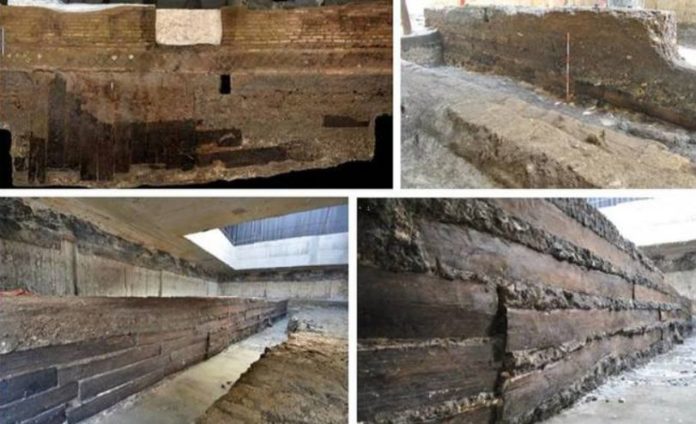A finding in the Italian capital demonstrates the extraordinary logistics developed by Ancient Rome in the trade of wood and other products
Some works for the extension of the Rome metro made between 2014 and 2016 allowed to find a treasure for historians. Not that it had much value in itself, because it was nothing more than a set of 24 oak boards. However, for the researchers, this modest finding has revealed information that had never been obtained before and now publishes the scientific journal PLOS ONE. The result speaks of the importance of the timber trade and the extraordinary logistics that the Romans had developed in the first century A.D. around it. A whole Ikea of the time.
Apparently, the remains were part of a porch of the gardens of Via Sannio that belonged to a rich and luxurious property. Rarely are wood so old in a state of conservation that allows them to be analyzed in detail. In this case, scientists have been able to determine their origin and the age of 13 of them. His conclusion is that the oak used came from the Jura Mountains in northeastern France, more than 1,700 kilometres away from the capital of the Roman Empire, and can be dated between 40 and 60 AD.
The sapwood, which is the outermost, clearest and youngest part of the wood and corresponds to the last growth rings of a tree, has been key to reaching these conclusions. When conducting dendrochronology studies (the science that studies growth rings) and comparing these samples with the known characteristics of Mediterranean and Central European oak, or a group of researchers from The Consiglio Nazionale Delle Ricerche (CNR) or National Research Council of Italy, led by Mauro Bernabei, he was able to determine the origin and date the tables. Without a doubt, they were all from neighbouring trees that had coexisted in time.
This was the transport
Taking into account that they are large beams and that they had to be moved along a huge distance, the authors suggest that they made an incredible trip for the time: most likely they were transported floating through the Rhone ( river that is born in Switzerland and flows into southern France, in the Mediterranean) and, possibly, also from the Saone, a tributary. From there they would cross the sea and enter Rome through the Tiber river.
In fact, “there is news about the transportation of wood, not only for construction, but also for luxury furniture.” Thus, at the time of Claudius, fourth emperor, who ruled between 41 and 54 AD., “a table was sold that came from Morocco for one million sesterces,” according to documentary sources, an extraordinary amount.
For Italian researchers, their finding demonstrates that the commercial organization of Ancient Rome was formidable, that wood was an article of vital importance – not only in construction or furniture manufacturing, but also in shipbuilding and even as firewood– and that its commercial network was very advanced. “Our study emphasizes the importance of wood for the Romans and the powerful logistics organization of their society,” says Bernabei in a press release. Somehow, the timber trade helped build the Empire.
Free trade or taxes?
In the case of wood and other products, it is not known if the inhabitants of the provinces could deliver them as a tribute or if there was a free trade, but both things probably coexisted. Above all, the state ensured the supply of food, wood, iron or any other product to Rome and the army and this, determined by a large logistics organization, determines the distribution and the possibility of free trade. “The needs of the state contributed to developing large-scale free trade,” says the expert. For example, if a merchant had to transport a certain number of oil amphorae for the army, he could carry some more for another type of sale.
“When it comes to supplying Rome and the army, two large regions are created, the Mediterranean West and the Mediterranean East. Within the West, there are provinces, such as Hispanics, especially Bética, which supplies food to Rome and the army,” Remesal points out.
Up to a point, trade was already globalized, but within the limits of the Ancient World. “The great civilizations were around the Mediterranean and communicated with the East through the Silk Road,” he says.
What is clear, and this study demonstrates again, is that the sea and waterways were the great highways on which Roman goods circulated. “If the Betica province develops as a great producer, it is because it has the Guadalquivir to give out food; and if these products can be distributed in Germania, it is because there is the Rhine River, which allows it to penetrate the territory,” says the professor at the University of Barcelona.
